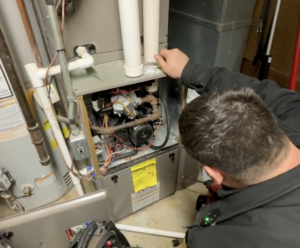Commercial HVAC Service in Louisville
An HVAC system is an important topic for you as a rental property investor, whether you invest in a small property or an apartment complex with many units. Repair and replacement of HVAC systems are one of your biggest ongoing costs and could affect your rental cash flow. To keep quality, long-term tenants you will need a system that works efficiently and keeps costs down.
Litsey Heating and Cooling are experts in working with both landlords and tenants to ensure that all parties are accommodated concerning scheduling, response, and cost. Any system is going to have a limited lifespan, but you can help prevent premature failure with a solid maintenance schedule in place. We offer annual service plans where an HVAC professional will come to the residence twice per year (once in the spring and once in the fall) to clean and service your whole system. We do an inspection of all equipment and any items that would need replacing would be eligible for a 10% discount.







Frequently Asked Questions
Commercial HVAC (Heating, Ventilation, and Air Conditioning) refers to the systems used to regulate the temperature, air quality, and comfort in commercial buildings. It includes heating systems, air conditioning units, ventilation systems, and refrigeration, all designed to ensure a comfortable indoor environment for employees, customers, and clients.
Regular maintenance is crucial to ensure the longevity and efficiency of your HVAC system. Proper maintenance prevents costly repairs, ensures optimal energy performance, and keeps the system running smoothly, reducing downtime and improving indoor air quality. Scheduled inspections can help detect potential issues before they become major problems.
For optimal performance, a commercial HVAC system should be serviced at least twice a year—once in the spring before cooling season and once in the fall before heating season. More frequent inspections may be necessary depending on the system’s usage and the building’s specific needs.
Some signs that your HVAC system may need repair include inconsistent temperatures, unusual noises (like rattling or grinding), increased energy bills, poor air quality, or if the system is blowing hot air instead of cool air (or vice versa). If you notice any of these signs, it’s important to call a professional HVAC technician.
Yes, we specialize in the installation of energy-efficient HVAC systems designed to reduce operating costs and improve environmental sustainability. These systems use less energy, which can significantly lower your utility bills while maintaining a comfortable indoor climate.
Commercial HVAC (Heating, Ventilation, and Air Conditioning) refers to the systems used to regulate the temperature, air quality, and comfort in commercial buildings. It includes heating systems, air conditioning units, ventilation systems, and refrigeration, all designed to ensure a comfortable indoor environment for employees, customers, and clients.
Regular maintenance is crucial to ensure the longevity and efficiency of your HVAC system. Proper maintenance prevents costly repairs, ensures optimal energy performance, and keeps the system running smoothly, reducing downtime and improving indoor air quality. Scheduled inspections can help detect potential issues before they become major problems.
For optimal performance, a commercial HVAC system should be serviced at least twice a year—once in the spring before cooling season and once in the fall before heating season. More frequent inspections may be necessary depending on the system’s usage and the building’s specific needs.
Some signs that your HVAC system may need repair include inconsistent temperatures, unusual noises (like rattling or grinding), increased energy bills, poor air quality, or if the system is blowing hot air instead of cool air (or vice versa). If you notice any of these signs, it’s important to call a professional HVAC technician.
Yes, we specialize in the installation of energy-efficient HVAC systems designed to reduce operating costs and improve environmental sustainability. These systems use less energy, which can significantly lower your utility bills while maintaining a comfortable indoor climate.
The lifespan of a commercial HVAC system can vary depending on the type of system, the amount of use, and how well it’s maintained. On average, a commercial HVAC system lasts about 15 to 25 years. Regular maintenance and timely repairs can extend its lifespan.



